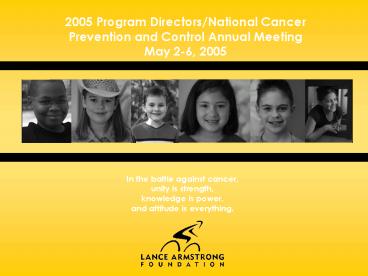WEARYELLOW LIVESTRONG - PowerPoint PPT Presentation
1 / 19
Title:
WEARYELLOW LIVESTRONG
Description:
In 1996, Lance was ranked the #1 cyclist in the world. ... to choose between winning the Tour de France or having cancer, I'd choose cancer. ... – PowerPoint PPT presentation
Number of Views:317
Avg rating:3.0/5.0
Title: WEARYELLOW LIVESTRONG
1
2005 Program Directors/National Cancer Prevention
and Control Annual Meeting May 2-6, 2005
In the battle against cancer, unity is
strength,knowledge is power,and attitude is
everything.
2
The Diagnosis
- In 1996, Lance was ranked the 1 cyclist in the
world. - In October 1996, doctors diagnosed Lance with
advanced testicular cancer. - Going untreated, the cancer had spread to his
lungs, abdomen and brain.
3
The Will to Win
- Lance declared himself a cancer survivor, not a
cancer victim. - He took an active role in educating himself about
his disease and his treatment. - Just five months after his diagnosis, Lance began
riding again. - If I had to choose between winning the Tour de
France or having cancer, Id choose cancer. -
Lance Armstrong
4
Beating the Disease
- During treatment, before his recovery, before he
even knew his own fate, Lance created the Lance
Armstrong Foundation. - In 1997, doctors declared Lance cancer-free.
- In 1998, Lance returned to professional cycling.
5
Lance Armstrong Foundation
Mission To enhance the quality of life for
those living with, through and beyond
cancer. The LAF believes that in the battle with
cancer, knowledge is power and attitude is
everything. From the moment of diagnosis, we
provide the practical information and tools you
need to live strong. Cancer Survivor An
individual from the time of diagnosis for the
balance of his/her life (includes family members
and loved ones).
6
Lances View of the LAF
- Too many people still lose their life to cancer,
but far more people are also surviving and
facing a lot of practical, physical, and
emotional challenges that accompany a cancer
diagnosis. - We stand with more than 10 million Americans who
are living with cancer today. We advocate for
their dreams and collaborate with their
caretakers. - Cancer Survivors guide our mission and inspire
our vision.
7
Significance of the LAF
- More than 10 million cancer survivors today
- More than 1.3 million people will be diagnosed
this year - 3 out of 4 families will help care for a family
member with cancer - 63 of adults and 70 of children diagnosed with
cancer today will be alive 5 years from now - 1 in 3 people will be diagnosed with cancer
during their lifetime
8
The LAFs Focus
9
Public Health
- The LAF is focused on establishing a
public health framework to serve the
physical, emotional and practical needs of cancer
survivors - 104 Community Program partners
- More than 2,000,000 in funding to community
non-profit organizations across the country since
1999 - National Action Plan for Cancer Survivorship A
guide for the public to on how to effectively
address cancer survivorship
10
National Advocacy Initiatives
- The LAF works to ensure that the voice of the
cancer community will be heard in Washington - The National Cancer Act (S.1899) would establish
the Office of Cancer Survivorship within the NCI - The Cancer Survivorship Research and Quality of
Life Act (H.R. 2986/S.1496) would expand research
and quality of life programs for cancer survivors
- LAF also supports increased federal funding for
the CDCs National Comprehensive Cancer Control
Program
11
Scientific and Clinical Research
- The LAF supports research that is not readily
funded by traditional sources - More than 9.6 million in grants given since 1998
- Young Investigator Research Awards and Research
Awards granted annually - Major support grants awarded to survivor care
programs
12
LIVESTRONG- Resource for Cancer Survivors
- Live Strong provides information and tools to
help people living with cancer understand the
physical, emotional and practical aspects of
being a cancer survivor. - This resource was created to educate survivors
and their friends, families and caregivers about
cancer survivorship. - Live Strong offers survivors a complete approach
to the survivorship experience.
13
What is LIVESTRONG?
- LIVESTRONG offers a variety of features
exploring the full range of physical, practical
and emotional information including - Survivorship Stories
- Survivorship Topics
- Survivorship Tools
14
Survivorship Stories
- Through research we learned that survivors feel
the most honest and credible information about
the cancer experience comes from other survivors. - Video (and text) stories allow survivors to share
their cancer experience in their own words. - Over 100 stories cover different diagnoses,
cancer stages, ages and backgrounds
15
LIVESTRONG- Resource for Cancer Survivors
- Captures essential knowledge and collective
wisdom from survivors. - Presents information from health care providers
and other experts in familiar and
easy-to-understand format. - Provides survivors a way to take ownership and
control of their own survivorship experience
16
Survivorship Topics
- Physical, emotional and practical issues
presented through high-level overviews that link
to more detailed information - Examples of Survivorship Topics
- Aftereffects of Cancer Treatment
- Emotional Effects of Cancer
- Health Insurance
- Communicate with Your Health Care Team
- Employment Discrimination
17
Survivorship Tools
- Tools to help survivors prepare for doctor
appointments, track medications and treatments,
communicate effectively with their health care
team, and keep track of practical information,
including estate, will and insurance information. - Survivorship Tools
- Medical Treatment Summary
- Health Journal
- Practical Information Summary
18
LIVESTRONG TODAY
There are three ways for survivors to use the
tools and information LIVESTRONG provides
- Go online at www.livestrong.org
- Order a LIVESTRONG Survivorship Notebook
- Call LIVESTRONG SurvivorCare toll free at
- 1-866-235-7205
19
Claire Schmidt, MPHPublic Health Program
ManagerLance Armstrong Foundationclaire.schmidt_at_
laf.org512-236-8820 x161































